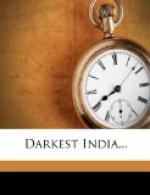In dealing with this portion of the Submerged Tenth there can be no doubt that the religious and moral appeals of the Salvation Army Officers will serve to stimulate and enforce wholesale reformation. By substituting the attractions of our public meetings, we shall do much to counteract those of the liquor den and other factories of pollution and destitution,—for it is as such that we may regard the places where drunkards, opium-eaters, prostitutes, fornicators, and the other hideous satellites of Vice are manufactured wholesale, whether with or without the shelter of a license. A large proportion of those who are engaged in vice as a trade openly profess to do so as a means of subsistence, and because it enables them to eke out what is in nine cases out of ten but a scanty subsistence, and what is almost invariably accompanied by the most terrible penalties Nature can inflict on those who outrage her ordinances. Many are heartily sick of the trade, but can see no way of escape. In dealing with destitution we shall open for these a door of hope. The deserters from the ranks of those who trade in vice will help us to deal more effectively with those who still cling to the profession on account of its profits.
In dealing with the panderers to the vices of society we shall largely diminish the numbers of its victims. It has been said that sinning is very much a matter of temptation, and in reducing those temptations, as we believe General Booth’s scheme will largely tend to do, we shall be able to reduce in quantity, if we cannot hope to cause altogether to cease, the frightful holocaust of human victims that is annually offered up at this dark shrine.
(a) The Drunkards.
I will take the question of the Drunkard first, for it is itself a prolific root of all kinds of evil. The gradual breaking up of religious restraints, the increasing facilities for obtaining at smallest cost the most fiery and dangerous liquors, the added suffering entailed on any drinking habits that may be formed by the tropical heat of India, all serve to accentuate the gravity of the evil in this country. Add to this a consideration of the distressing poverty, the chronic hunger, the dull monotony, unrelieved by hope of amendment, in which myriads of the people of India fight out the battle of life; reflect how these must crave for the boon of forgetfulness and eagerly grasp at the wretched relief which drunkenness may bring. Nor can we throw the responsibility altogether upon the individual, if it be true that prior to contact with Western nations, the Hindoos were largely a temperate and even an abstinent people. We are in an especial manner bound to consider whether there can be found any alleviation or remedy for a disaster which, if we have not actually created, we have at least suffered to spring up unheeded and unchecked in our very midst.
It is notorious that the large cities of India are crowded with shops of the kind thus described by Mr. Caine, late M.P., in his “Picturesque India”:




